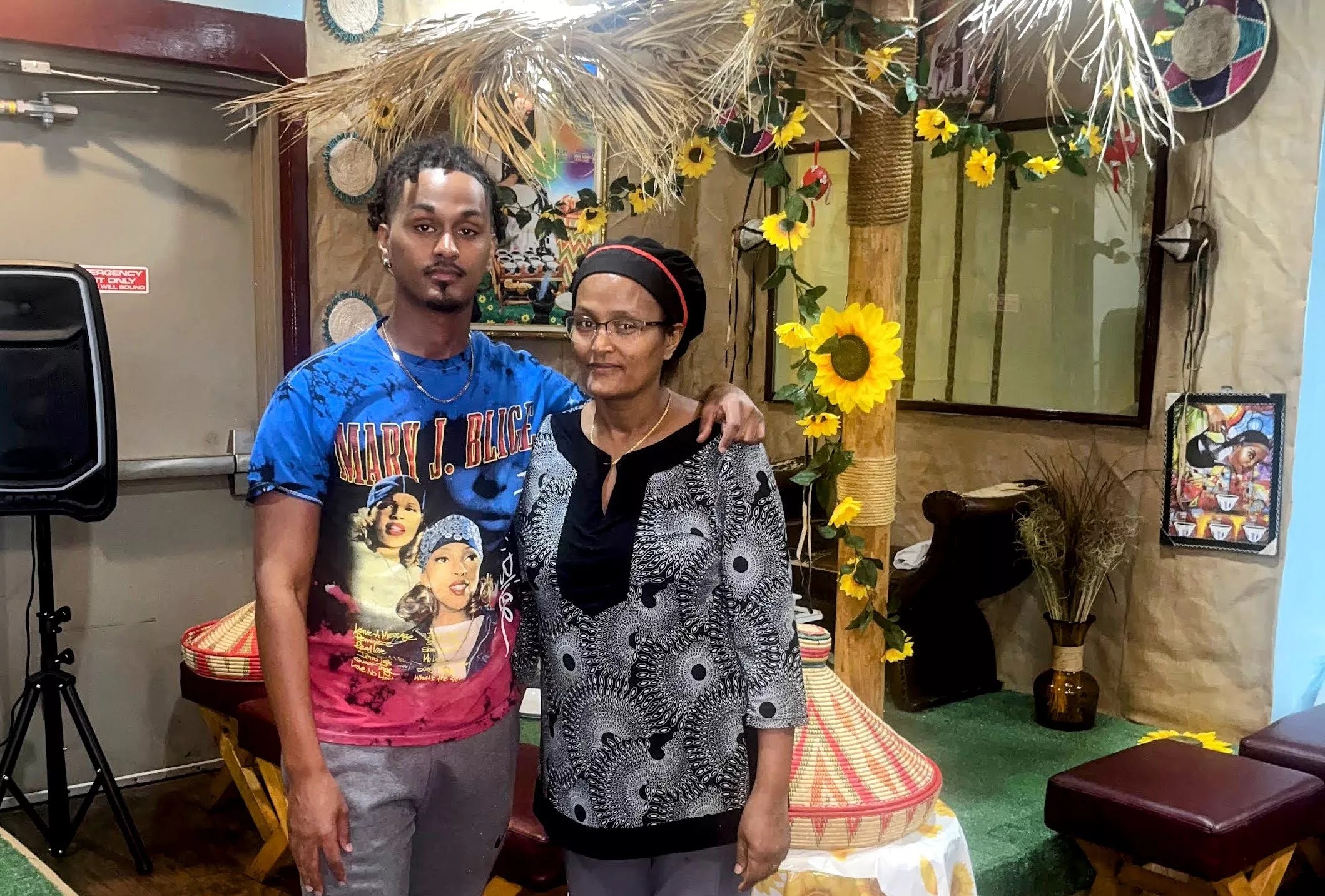
Mike Madriaga

Audio By Carbonatix
Ethiopian Famous Restaurant & Cafe, a treasured name in the Valley’s dining scene, has returned triumphantly.
Originally located behind a curtain at the back of a convenience store on Roosevelt and 16th streets, the restaurant captivated food lovers when it opened in 2011. Phoenix New Times featured its founder, Abebech “Abby” Ejerssa, in 2012, the same year the restaurant got its own digs on McDowell Road.
Known for serving dishes in mesob breadbaskets, the spot quickly grew popular, earning two back-to-back Best of Phoenix accolades and drawing lines out the door.
But in 2016, the restaurant suddenly closed.
“At that time, my brother and I were still young,” Fraool Muleta recalls. “We weren’t able to contribute much, more than just wiping down the tables. Also, my little sister was just born, and my mom’s priority was ensuring my siblings and I were cared for without her investing too much time into the restaurant.”
But this summer, the restaurant reopened in Tempe near Arizona State University.
Muleta, now 24, and his younger brother are central to the restaurant’s revival, managing the front while their mom cooks in the back with her longtime friend and assistant, Hawa Garado. Their little sister, almost 9, often spends time at the restaurant reading books, doing schoolwork or simply enjoying her free time.
Since reopening in June, the family has returned to serving Ejerssa’s signature slow-cooked stews, saucy meats and spicy vegetables atop the spongey yet porous injera bread that soaks up the rich flavors.

The vegan platter at Ethiopian Famous Restaurant includes a selection of vegetable stews.
Mike Madriaga
Muleta’s role extends beyond running the front of the house; he’s also a guide to Ethiopian cuisine for curious diners.
“A lot of our customers have been through word of mouth and through the reviews on Google,” he says, explaining that a large part of his job includes helping customers “get an idea of what they are eating and what kind of culture they are being introduced to.”
For first-timers, Muleta recommends Doro Wot, a chicken stew marinated in berbere spices and served with a drumstick, a hard-boiled egg and a side of cottage cheese.
“It’s a staple to Ethiopian culture,” he says. “If you go to any restaurant there, you’ll always find Doro Wot.”
Muleta moved from Ethiopia to Phoenix with his mother when he was 6 years old. One dish that reminds him of home is his mother’s Shiro Wot.
“It’s ground-down chickpeas and a really thick stew, and we serve it with injera bread,” he says. “I used to eat that every day growing up.”
It’s an aromatic and spicy vegetarian dish with niter kibbeh – a seasoned and clarified butter and berbere spice.
“Berbere is in a lot of our food,” Muleta says of the spice blend, which is a tad spicy and earthy in flavor. Mid-sentence, his mom calls out from the kitchen. An order is ready.

In the center of the restaurant, mesob tables — intricately woven breadbaskets — invite diners to share meals.
Mike Madriaga
The restaurant’s ambiance enhances the experience. The dining area features a straw hut built on a raised stage, a ceremonial coffee display, vibrant images of Ethiopia and traditional instruments like the keboro drum. In the center, mesob tables – intricately woven breadbaskets – invite diners to share meals traditionally.
Mesob is the Amharic word for a breadbasket. It’s where Ethiopians generally store injera, the country’s traditional flat bread served with most dishes. Mesobs are made of dyed palm tree leaves and grass, woven in various sizes for different purposes.
Muleta returns with a handheld cylindrical mesob containing a two-foot platter of warm, tasty fare. With his other hand, he graciously picks up the mesob cover on our table and places the platter inside.
The platter has six different dishes on top of the injera bread. Muleta explains the dishes one by one.
“This is all vegan, this is cabbage and carrots, these all across are lentils, and this is Shiro Wot, that’s a salad and that’s collard greens,” he says, before demonstrating the communal eating style that is customary in Ethiopia.
“You use three fingers like a claw machine and pinch,” he says. “The injera absorbs the sauce and spices, and you get the full experience.”
While utensils aren’t provided by default, they are available upon request.
Next, he brings out two meat platters – Kitfo, a seasoned ground beef dish, and Tibs, made with marinated beef sauteed with spices, onions and peppers.
The restaurant’s location near ASU has helped foster a connection with Ethiopian students eager for a taste of home.
“We thrive here,” Muleta says. “Having a young community of Ethiopians who are looking for something authentic and healthy has been great. We’ve even coordinated events with the East African and African American student unions.”
Ethiopian Famous Restaurant & Cafe’s new location also nods to its past. The space previously housed YS Mandi Mediterranean restaurant, and the menu still includes Mediterranean favorites like chicken shawarma and lamb mandi. The connection is personal, as the previous owner, Garado, now works alongside Ejerssa.
“It’s the best of both worlds,” Muleta concludes. “Hawa trusted my mom to keep the food’s integrity and ensure her previous customers stayed happy. My mom’s experience in Yemen as a cook made it possible to offer both Ethiopian and Mediterranean dishes – keeping everyone coming back for more.”
The return of Ethiopian Famous Restaurant & Cafe is more than a reopening; it celebrates culture, family and resilience.
Ethiopian Famous Restaurant & Cafe
933 E. University Dr. #112, Tempe